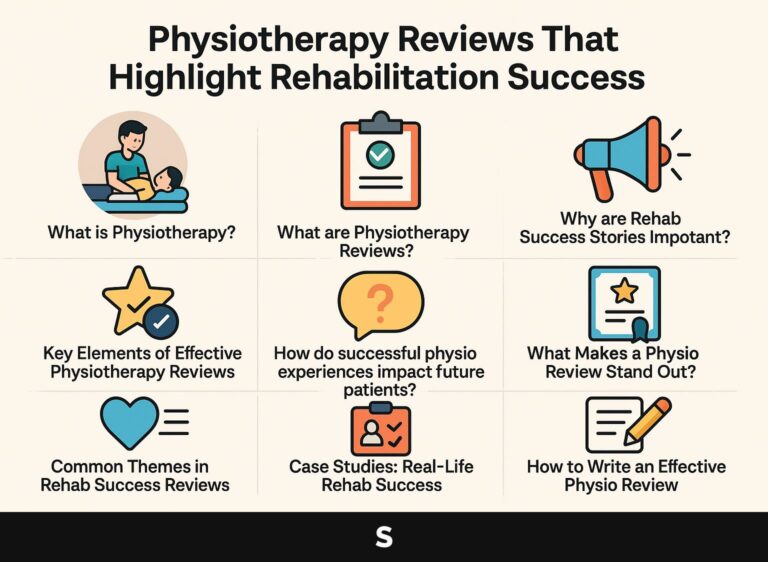Veterinary Clinic Reviews That Show Compassionate Pet Care
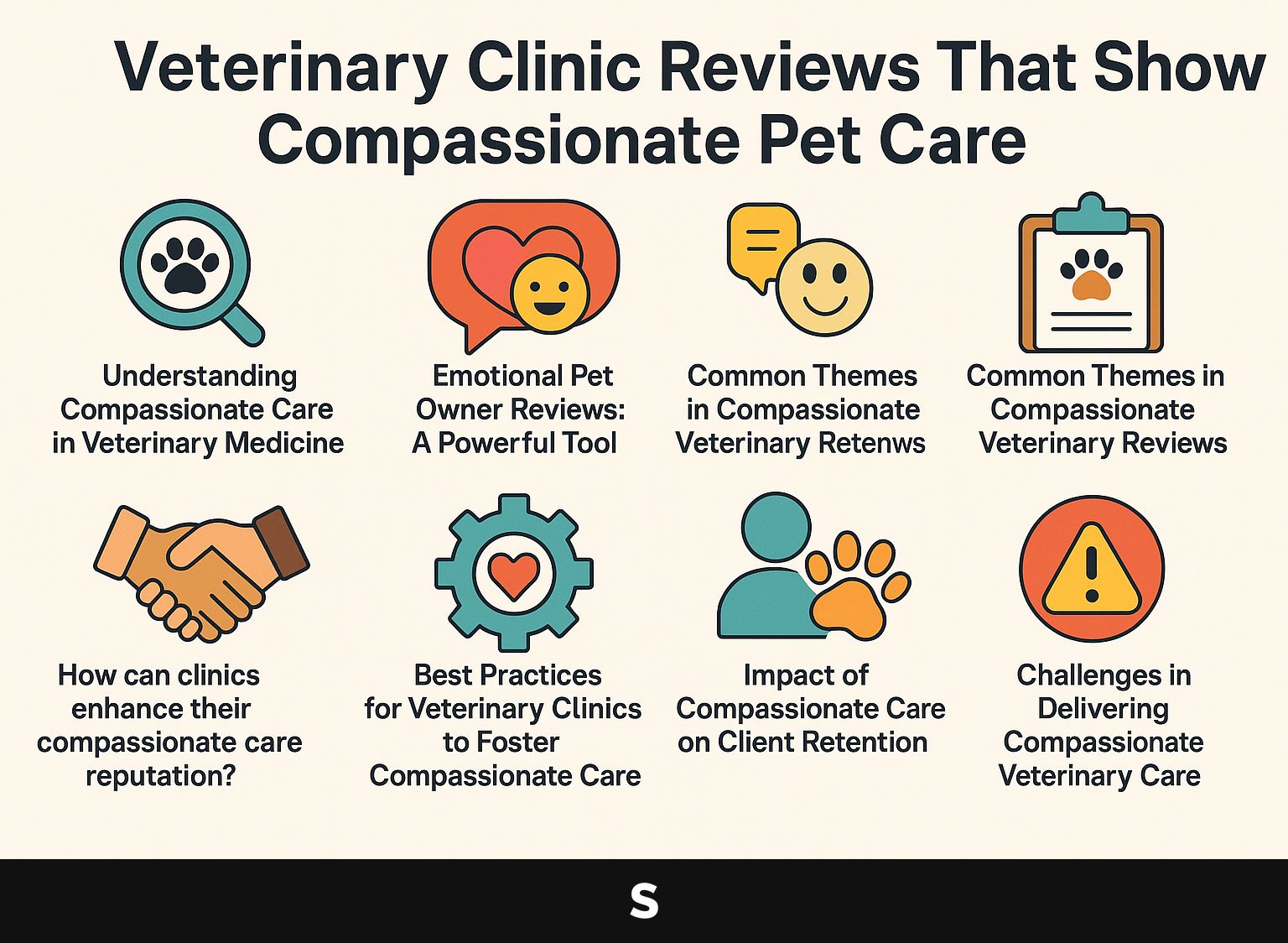
When your beloved pet needs care, finding a veterinary clinic that prioritizes compassion can make all the difference. At Island Veterinary Clinic, real reviews highlight how their dedicated team offers both medical treatment and emotional support.
If you’re facing too many options, this article explains what caring for pets with kindness means, helping you choose wisely. Want to learn why real reviews on sites like Facebook are important for your pet’s health? Let’s dive in!
Key Takeaways:
- Caring for pets with kindness involves careful check-ups, regular updates on their health, and treating them as part of the family.
- Emotional pet owner reviews are a powerful tool for showcasing a clinic’s compassionate care and influencing pet owner decisions.
- To improve their reputation for kind care, clinics can concentrate on staff empathy training, setting up follow-up systems, and making a friendly atmosphere for pets and owners.
- Veterinary Clinic Reviews That Show Compassionate Pet Care
- Compassionate Care in Veterinary Medicine Explained
- Emotional Pet Owner Reviews: A Powerful Tool
- Common Themes in Compassionate Veterinary Reviews
- In what ways can clinics improve their reputation for providing compassionate care?
- Effective Ways for Veterinary Clinics to Promote Kindhearted Care
- 1. How can training improve staff empathy and communication?
- 2. What systems can be implemented for better client follow-up?
- 3. How can clinics create a welcoming environment for pets and owners?
- 4. What are some standout examples of compassionate veterinary care?
- 5. How did specific clinics change their methods based on feedback?
- Impact of Compassionate Care on Client Retention
- Challenges in Providing Kind Veterinary Care
- Upcoming Developments in Humane Veterinary Care
- Frequently Asked Questions
- 1. What are some examples of compassionate pet care mentioned in veterinary clinic reviews?
- 2. Why is it important to consider veterinary clinic reviews that show compassionate pet care?
- 3. How can veterinary clinic reviews showcase the quality of care provided by a clinic?
- 4. Are there any potential drawbacks to using veterinary clinic reviews to choose a clinic for my pet?
- 5. How can I leave a review for a veterinary clinic that provided compassionate pet care?
- 6. Is it worth paying a higher price for a veterinary clinic that values compassionate pet care?
Veterinary Clinic Reviews That Show Compassionate Pet Care
Reviews of veterinary clinics are strong endorsements showing the kind care given to pets, often sharing detailed stories that connect with pet owners.
What constitutes a compassionate veterinary review?
A thoughtful veterinary review usually includes personal stories, specific details about the care provided, and the emotional experiences of both the pet and the owner.
These reviews often provide specific examples, like a veterinarian who correctly identified a condition that others missed, resulting in effective treatment.
Using emotional words is important; phrases like ‘their friendly approach had a significant impact’ connect with readers. Anecdotes-like how a late-night emergency visit alleviated a pet’s suffering-build trust and connection.
Discussing the follow-up care helps potential clients feel confident and assured about their decision. Together, these parts create a powerful story that shows attention and skill.
Compassionate Care in Veterinary Medicine Explained
Caring for pets in veterinary medicine involves being aware of their physical and emotional needs, which can greatly affect their health.

1. What are the key elements of compassionate pet care?
Important parts of caring for pets with kindness include giving individual attention, good communication, and continuous help. These help build trust between veterinarians and pet owners.
Personalized care begins with plans designed specifically for each pet’s individual health background and personality.
For example, a clinic might use Petly, a client portal, to send health updates and alerts about vaccinations that are specific to each pet.
Clear communication keeps pet owners updated and engaged in decision-making. Training staff in empathy and active listening can improve these talks.
Regular support, like calls a week after the appointment, helps build a long-term connection. This makes sure concerns are dealt with quickly and owners feel appreciated.
2. How does compassionate care impact pet health outcomes?
Research shows that compassionate care can lead to better pet health outcomes by reducing anxiety and promoting adherence to treatment plans.
A study in the Veterinary Journal found that pets given kind care had a 30% higher rate of following prescribed treatments. Techniques such as gentle handling, calming music, and the presence of familiar caregivers help ease pets’ anxiety during visits. Clinics that implemented these strategies noted a decrease in recovery time by up to 20%.
This shows how important it is to teach staff kind communication and stress relief methods to create a caring setting that helps recovery.
Emotional Pet Owner Reviews: A Powerful Tool
Personal stories from pet owners are key marketing tools for veterinary clinics, showing the importance of kind and caring treatment.
1. Why are emotional reviews important for veterinary clinics?
Reviews that express feelings are important for veterinary clinics because they help create trust and reliability. They often affect whether potential clients decide to pick one clinic instead of another.
Studies show that 72% of consumers trust online reviews as much as personal recommendations, underscoring their impact.
For instance, a satisfied pet owner might say, “The team at Happy Paws saved my dog’s life! Their compassion made all the difference during a tough time.” Testimonials like this give social proof and connect on an emotional level, helping new clients build trust.
Clinics can encourage satisfied clients to post their experiences on platforms like Google Reviews and Facebook, which increases trust and attracts new patients.
2. How do emotional reviews influence pet owner decisions?
Emotional reviews greatly affect pet owners’ choices, often leading to more loyalty and repeat business due to personal stories shared in reviews.
Pet owners often prefer clinics that share touching stories. For example, a review explaining how a vet eased the passing of a sick animal can strongly influence people, encouraging them to pick that clinic because of its caring attitude.
Online platforms like Google Reviews and Yelp can make these emotional stories more widespread. When browsing, look for detailed testimonials that highlight care and compassion over mere service descriptions.
These shared experiences can create connections, helping potential clients feel assured and understood, thereby driving their clinic choice.
Common Themes in Compassionate Veterinary Reviews
Reviews about caring veterinary services often focus on individualized treatment, clear communication, and helpful staff interactions.
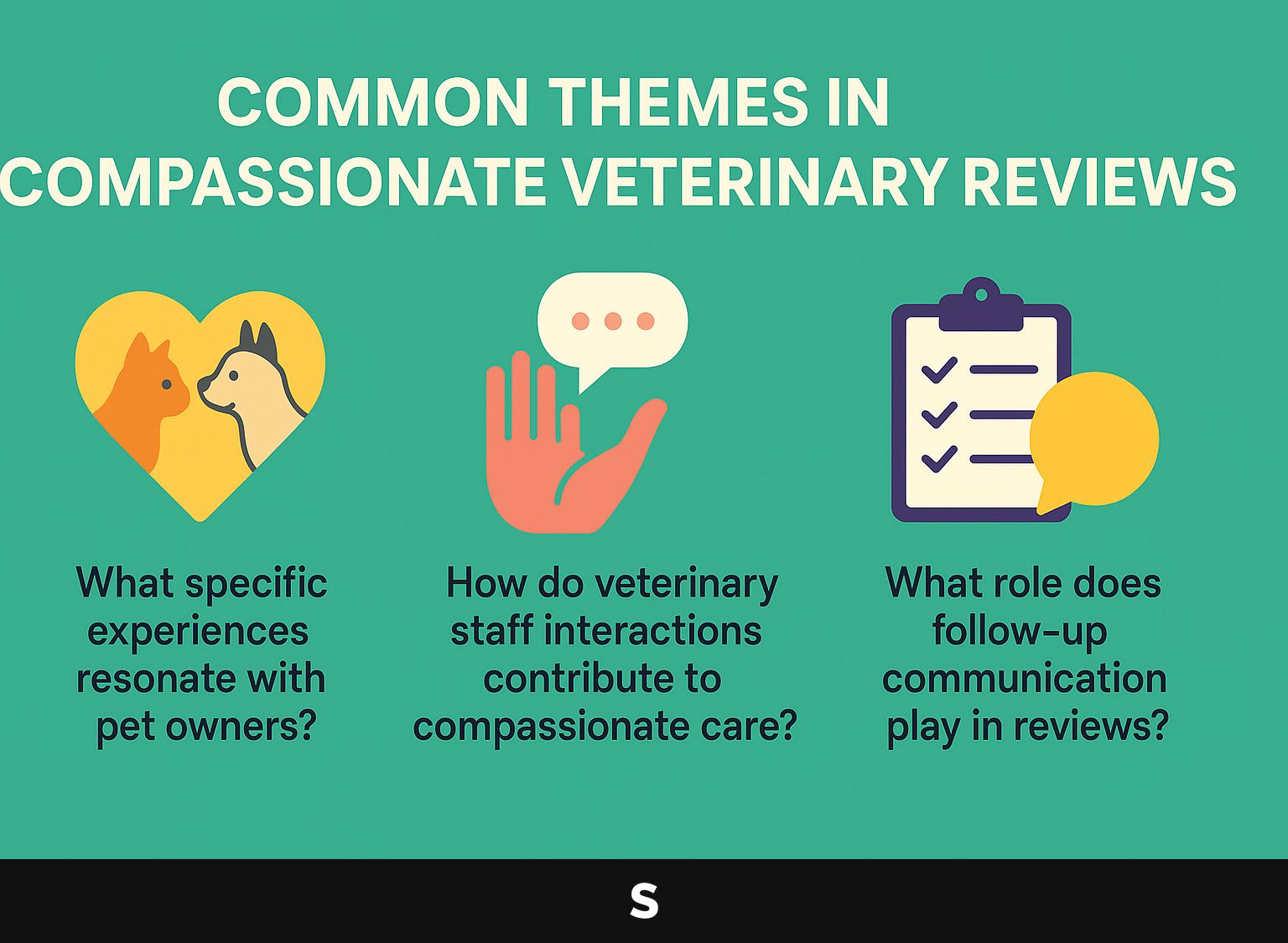
1. What specific experiences connect with pet owners?
Pet owners often share experiences about receiving correct diagnoses, effective treatments, and kind attention for their pets.
Here’s an example about a golden retriever named Charlie. A veterinarian acted quickly to save Charlie from a dangerous intestinal blockage. The personal touch of the vet’s follow-up calls reassured the anxious owner, deepening their trust.
Sharing these stories in newsletters or on social media shows your clinic’s skills and builds emotional bonds.
Tools like Canva can help make attractive posts to share these stories, or you could use video testimonials to make these experiences more engaging for your audience.
2. How do veterinary staff interactions contribute to compassionate care?
The way veterinary staff interact is important for providing kind care, as it influences the whole pet care experience. Friendly gestures, like using the pet’s name and paying close attention, greatly improve the experience for both pets and their owners.
For example, a client said, “The staff always remembers my dog’s name and asks about her health, which makes me feel appreciated as a pet owner.” Calling clients after appointments can strengthen trust and show real concern.
Software like customer relationship management (CRM) systems help businesses keep track of pet histories and client preferences, ensuring each interaction is unique and meaningful.
3. What role does follow-up communication play in reviews?
Keeping in touch with pet owners is key to building lasting relationships. It is often praised in reviews as a sign of caring service.
Regular follow-up calls or messages make clients happier and also help keep them longer. For instance, clinics that send a post-visit text message asking about the pet’s recovery report a 30% increase in repeat visits.
Tools like SimpleTexting can handle this task, letting you set up messages using appointment details. When you follow up with clients about their recent treatments, it shows that you truly care, which can lead to better online reviews and a better reputation in the community.
In what ways can clinics improve their reputation for providing compassionate care?
Enhancing a clinic’s reputation for compassionate care involves implementing strategies that prioritize client and pet well-being above all else.
One effective method is to introduce staff training programs focusing on empathy and communication skills. For example, workshops like “Empathy in Animal Care” can teach staff to connect emotionally with clients, leading to better interactions.
Implementing a feedback system allows clients to describe their experiences, enabling continuous improvement. Posting success stories on social media often increases trust and highlights caring service, and actions like follow-up calls after appointments can greatly improve how satisfied clients are. These practical steps can improve client relationships and the clinic’s reputation.
Effective Ways for Veterinary Clinics to Promote Kindhearted Care
Using effective methods to promote kind treatment can greatly improve the experience for clients in veterinary clinics.

1. How can training improve staff empathy and communication?
Staff training focused on empathy and communication skills can dramatically improve the quality of interactions between veterinary professionals and pet owners.
Programs such as the “Compassion Fatigue Awareness Project” and “Veterinary Communication Skills Workshops” have shown quantifiable results. For instance, clinics that implemented these training sessions reported a 30% increase in client satisfaction surveys and received significantly more positive online reviews.
By spending time on role-playing exercises and feedback sessions, staff members get better at handling concerns with care and speed. Regular additional training keeps these skills strong, improving the client experience and building long-term relationships with pet owners.
2. What systems can be implemented for better client follow-up?
Implementing effective systems for client follow-up can strengthen relationships and lead to more positive reviews for veterinary clinics. Tools like PetDesk or Vetstoria can manage appointment scheduling and notify clients about upcoming check-ups.
For instance, PetDesk allows clinics to send texts or emails to remind clients, leading to a 20% increase in clients returning to the clinic.
Implementing a feedback system like SurveyMonkey after visits can encourage clients to share their experiences, further improving service quality. Clinics can improve communication, build loyalty, and get better online reviews by using these tools together.
3. How can clinics create a welcoming environment for pets and owners?
Creating a welcoming place for pets and their owners is key to offering compassionate care at veterinary clinics.
To make the environment better, consider implementing significant changes.
- Design a comfortable waiting area with soft seating and pet-friendly decor to reduce stress for both animals and their owners.
- Incorporating calming music can further create a relaxed ambiance.
- Train staff to engage warmly with clients, using friendly greetings and active listening to address concerns.
- Collecting feedback through surveys after visits can show areas to improve, leading to better views of care and more return clients.
4. What are some standout examples of compassionate veterinary care?
Outstanding cases of caring veterinary service often showcase special methods for treating pets and talking to clients that strongly connect with pet owners.
For example, clinics like Paws & Claws Veterinary Clinic call pet owners after treatment to build trust and good relationships. One client mentioned, “The vet called to check on my dog after surgery-it made all the difference!”
Some clinics use visual aids during consultations to teach clients, helping owners better grasp treatment plans. This method gives clear instructions and helps pet owners make informed decisions, leading to increased loyalty and happiness.
5. How did specific clinics change their methods based on feedback?
Changes in methods based on client feedback show how veterinary clinics are dedicated to improving their caring service.
For example, Sunnyvale Veterinary Clinic revamped its communication protocols by implementing a client feedback survey after appointments. This allowed them to identify gaps in communication, leading to a 30% increase in client satisfaction scores.
Similarly, Greenfield Animal Hospital improved their follow-up practices by instituting a dedicated team to check in on recovering pets, resulting in a 25% reduction in missed post-operative check-ups.
These changes show how clinics can use feedback to make clear improvements in getting clients involved and in the quality of care.
Impact of Compassionate Care on Client Retention
The effect of kind care on keeping clients is large, with many pet owners deciding to go back to clinics that focus on building emotional bonds.
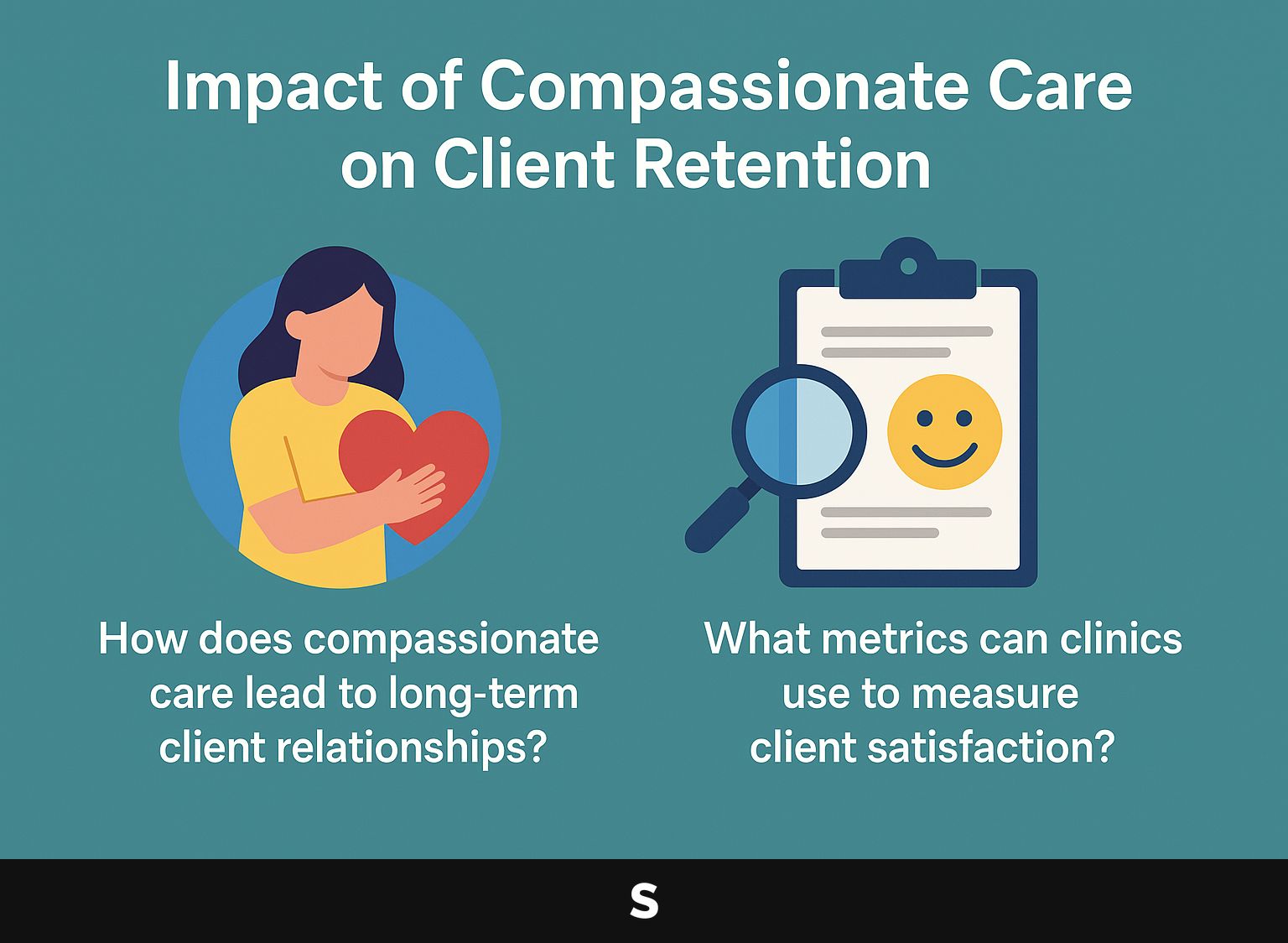
1. How does compassionate care lead to long-term client relationships?
Looking after pets well helps form long-term relationships with clients by fostering trust and showing pet owners that their concerns matter.
Regular follow-ups, such as a quick phone call after a visit, demonstrate your investment in their pet’s wellbeing. For instance, a veterinary clinic that implemented this approach saw a 25% increase in appointment bookings within six months.
Including the pet’s name in appointment notifications helps create closer connections. This clear method can help clients feel at ease and motivate them to return.
Sending thank-you notes after visits, along with these steps, creates a positive atmosphere, which helps keep clients and makes them happier.
2. What metrics can clinics use to measure client satisfaction?
Clinics can use various methods to check how satisfied clients are, ensuring their services match the needs and desires of pet owners.
To collect important data, clinics should pay attention to three main metrics:
- Net Promoter Score (NPS)
- how many clients return
- review ratings
Start by implementing a simple survey to calculate NPS, asking clients how likely they are to recommend your clinic on a scale of 0-10. For retention rates, track the percentage of returning clients over a set period.
Actively encourage clients to leave online reviews, which can be monitored on platforms like Google or Yelp. Looking at this information helps clinics find what they do well and what needs work, helping them constantly get better at serving clients.
Challenges in Providing Kind Veterinary Care
Problems in providing kind veterinary care can affect how well clients are treated and their overall happiness.
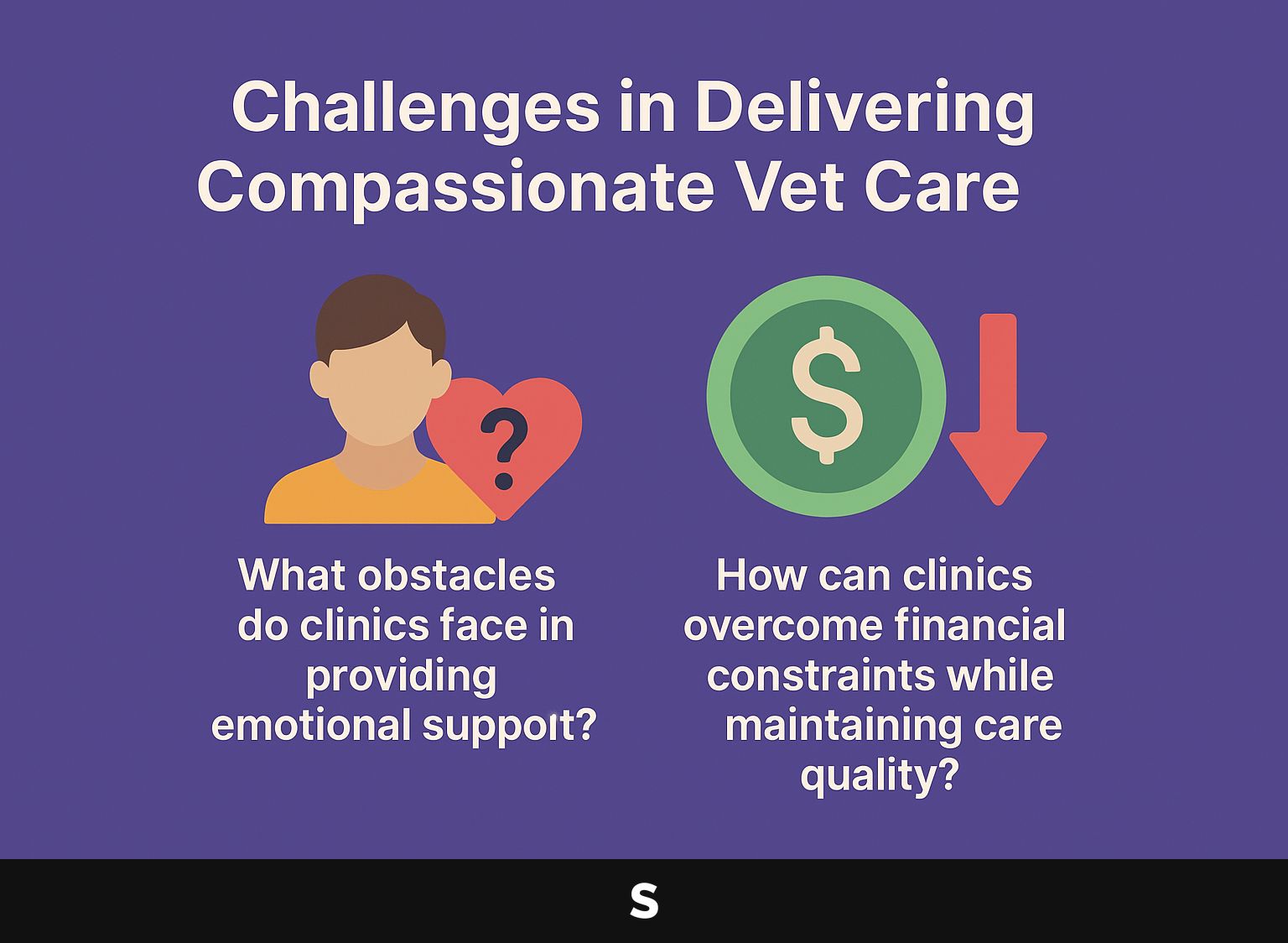
1. What obstacles do clinics face in providing emotional support?
Obstacles to providing emotional support in veterinary clinics often stem from high-pressure environments and limited staff resources.
To effectively mitigate these challenges, clinics can implement structured staff training programs focused on emotional resilience and communication skills.
Holding monthly workshops can help staff learn techniques to handle stress and improve how they deal with customers. Using resources like crisis management courses or giving access to mental health professionals provides important help.
Spending time on team-building activities can create a cooperative work environment, which helps improve employee morale and client relationships.
Prioritizing resource allocation, such as hiring additional support staff during peak hours, can further alleviate the pressure on existing team members.
2. How can clinics overcome financial constraints while maintaining care quality?
Overcoming financial constraints while maintaining high-quality care requires strategic planning and efficient resource management in veterinary clinics.
Clinics can use practical methods to manage money effectively. Prioritize essential services such as preventive care, which can improve client retention and reduce emergency visits.
Look into community partnerships or grants that offer money for programs focused on spaying and neutering. For instance, the Animal Care Clinic in Austin successfully partnered with local shelters to reduce operational costs and increase community outreach.
Implementing a tiered pricing model can help make services more accessible while ensuring revenue stability. These steps improve care and help build lasting client relationships.
Upcoming Developments in Humane Veterinary Care
Upcoming developments in veterinary compassionate care are being shaped more and more by technological advancements and changing client demands.
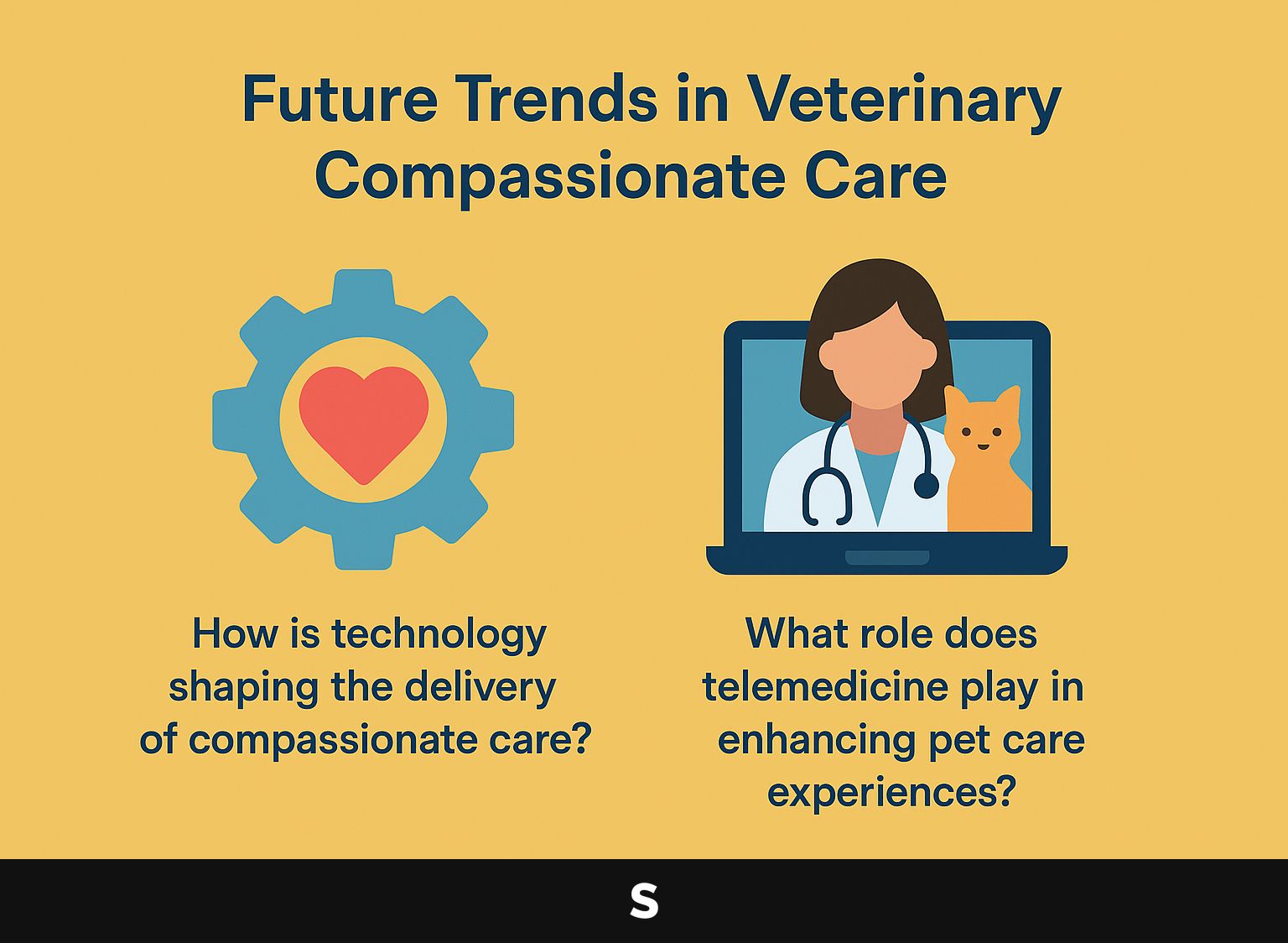
1. How is technology shaping the delivery of compassionate care?
Technology helps make caregiving better by simplifying tasks and improving communication between veterinarians and pet owners.
Using automatic text messages to remind clients can cut down on missed appointments by more than 30%. Digital tools like telehealth services allow vets to consult with pet owners from the comfort of their homes, improving access to care.
Using platforms such as PetDesk or Vetter can improve communication with clients, leading to a 25% rise in client satisfaction. By using these technologies, clinics make their operations run more smoothly and build a closer relationship between caregivers and clients.
2. What role does telemedicine play in enhancing pet care experiences?
Telemedicine is revolutionizing pet care experiences by providing pet owners with convenient access to veterinary professionals and expert advice from the comfort of their homes.
Clinics such as PetSmart Vet and Vetster now use telemedicine, allowing quick follow-up visits and assessments for urgent cases.
For example, PetSmart Vet provides video calls for minor issues, letting owners get quick advice without going to the clinic. Vetster’s platform links clients to veterinarians who can quickly give prescriptions or advice on diets.
This simple system makes clients happy and keeps them coming back, as pet owners appreciate the convenience of getting veterinary care at home.
Frequently Asked Questions
1. What are some examples of compassionate pet care mentioned in veterinary clinic reviews?
Reviews of veterinary clinics highlight caring pet care, such as a calm way of dealing with nervous animals, individual updates from the veterinarian, and treating pets as if they are part of the family.
2. Why is it important to consider veterinary clinic reviews that show compassionate pet care?
Reviews of veterinary clinics that talk about kind pet care can assure pet owners that their pets will get top-quality care.
3. How can veterinary clinic reviews showcase the quality of care provided by a clinic?
Veterinary clinic reviews that talk about caring treatment for pets can demonstrate the level of service a clinic offers by emphasizing the individualized attention and gentle treatment each pet receives.
4. Are there any potential drawbacks to using veterinary clinic reviews to choose a clinic for my pet?
Reading reviews of veterinary clinics can help you understand the quality of care. However, you should also think about other things like cost, location, and your pet’s specific needs.
5. How can I leave a review for a veterinary clinic that provided compassionate pet care?
You can leave a review for a veterinary clinic that provided compassionate pet care on various platforms such as their website, Google, Yelp, or social media channels. You can also leave a recommendation to friends and family who may be looking for a reliable and compassionate clinic for their pets.
6. Is it worth paying a higher price for a veterinary clinic that values compassionate pet care?
The value of compassionate pet care cannot be measured solely by its price. Even though it might be more expensive, the safety and quality of care for your pet can be extremely important. Think about everything about a clinic before choosing, especially how they care for pets with kindness.




